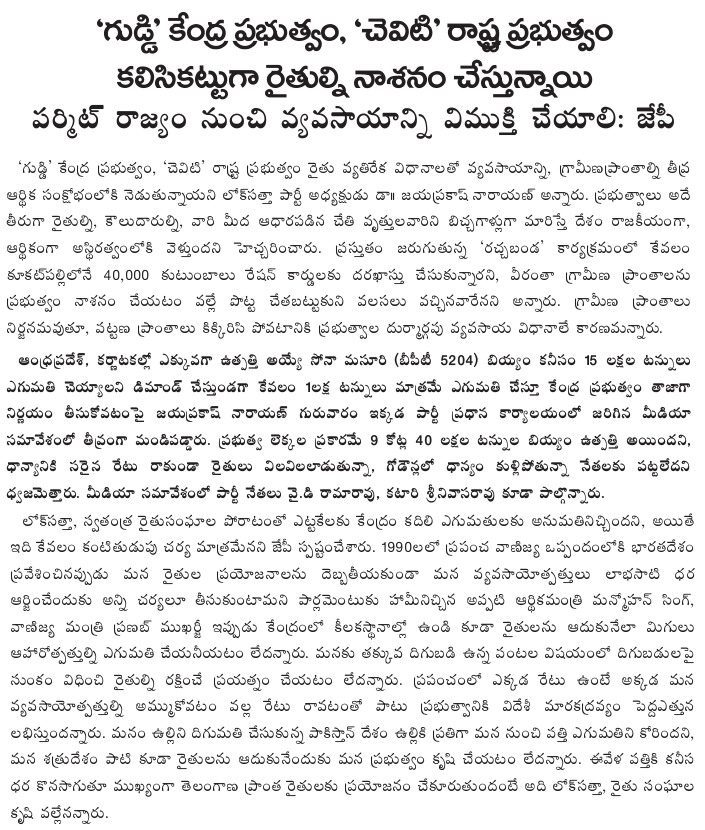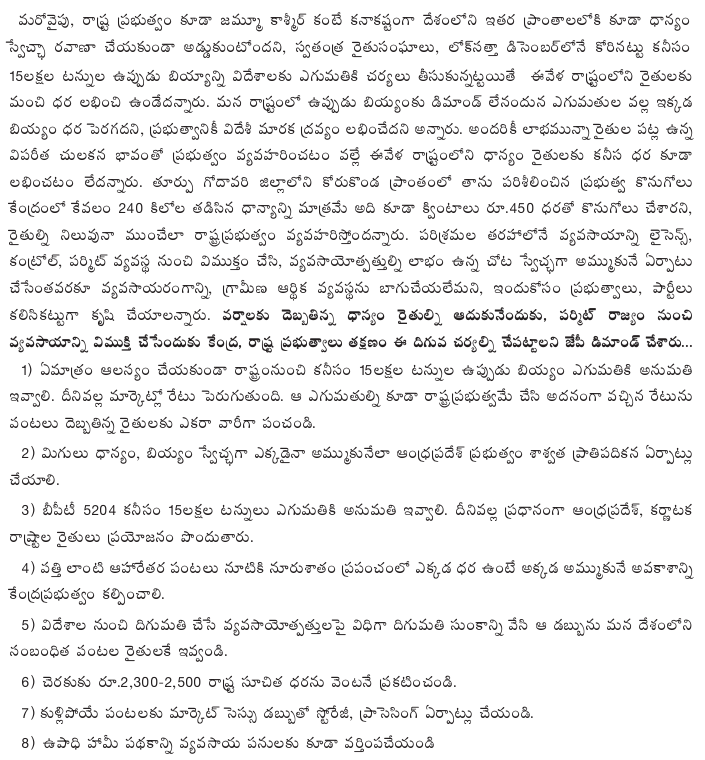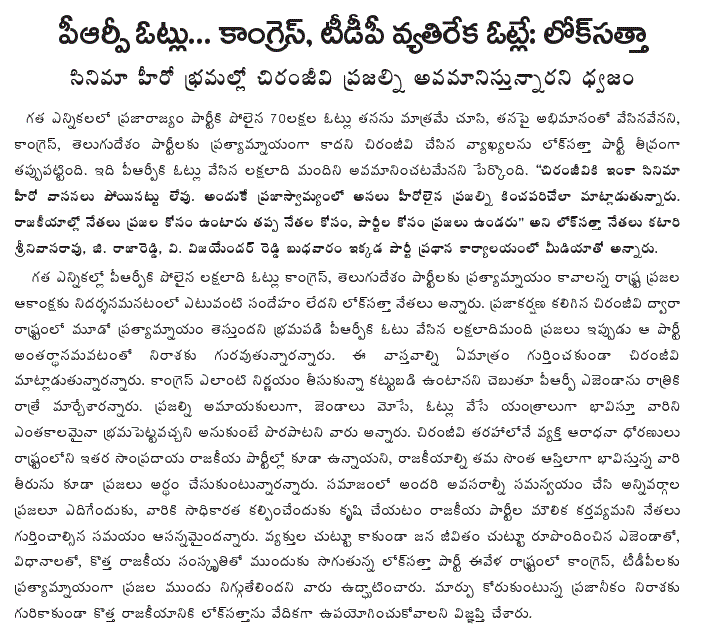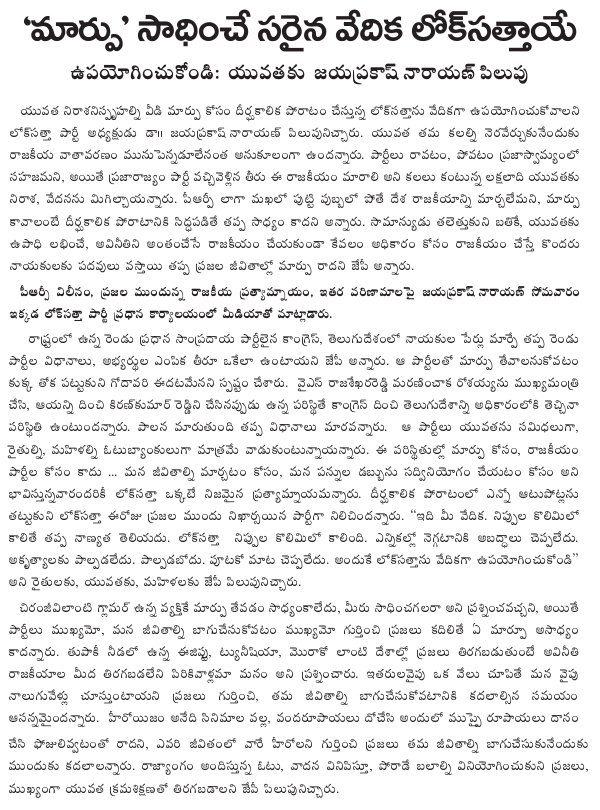Press Releases Archive
Unshackle agriculture from License-permit raj: Dr. JP
A ‘blind’ Government of India and a ‘deaf’ Andhra Pradesh Government have been accentuating the serious crisis in the countryside with their anti-farmer policies, charged Lok Satta Party President Dr. Jayaprakash Narayan here today.
If the Union and State Governments persisted with policies that only pauperized farmers, tenants and artisans dependent on them, the county would have to reckon with political instability and economic stagnation, Dr. JP told a media conference.
That as many as 40,000 families applied for ration cards during the current rachchabanda program in just one constituency – Kukatpally in Hyderabad - testified to the magnitude of the crisis in the rural economy and the consequent exodus to urban areas.
The immediate provocation for Dr. JP’s outburst was the Government of India decision to permit export of a mere one lakh tons of sona masuri (BPT 5204) against the demand for export of at least 15 lakh tons of the variety, produced largely in Andhra Pradesh and Karnataka.
The Government of India did not take cognizance of warehouses overflowing with old rice stocks and farmers reaping bumper harvests when it decided on the meager export quantum. The Union Government’s policies are in total contravention of the commitments it made to Parliament when India joined the World Trade Organization. Dr. Manmohan Singh as Finance Minister and Mr. Pranab Mukherjee as Commerce Minister then had told Parliament that the Government would safeguard farmers’ interests by promoting exports and curbing imports through suitable mechanisms.
The Government of India would not allow rice exports, put a restriction on the quantum of cotton exports, allow duty-free import of edible oils and fish and followed a flip-flop policy on onions. It crafts all its policies only to depress farmers’ incomes.
The Andhra Pradesh Government till recently banned even inter-district movement of rice, not to talk of inter-State movement.
Dr. JP listed a charter of demands on behalf of the Lok Satta and independent farmers’ organizations to provide immediate relief to farmers.
The Union Government should permit export of 15 lakh tons of boiled rice and 15 lakh tons of sona masuri variety of rice. Paddy damaged in the December 2010 rains is useful for conversion into boiled rice which commands a market overseas. Public sector agencies could export such boiled rice which has no demand in India and share the profits with farmers who suffered losses in the rains.
The Andhra Pradesh Government should remove once and for all the ban on movement of paddy and rice.
The Union Government should not impose any restrictions on export of non-food items like cotton. Governments can procure them at rates prevailing overseas, if necessary. It is welcome to permit import of commodities in short supply only after imposing import duties. It should share the revenue with farmers as an incentive to maximize production.
The Andhra Pradesh Government should announce a State Advisory Price of at least Rs. 2300 a ton for sugarcane. It should utilize the hundreds of crores of market cess it collects every year to promote storage and processing facilities.
The Union and State Governments should integrate the National Rural Employment Guarantee Scheme with agriculture to benefit both farmers and laborers.
When a reporter pointed out that Congress and Telugu Desam leaders were accusing each other of indulging in corruption running into Rs.1 lakh crore, Dr. JP said that both of them are speaking the truth although there may be the same dispute about the magnitude of the evil. That is why the Lok Satta Party would like the ruling and the Opposition parties to amend the Prevention of Corruption Act in the coming budget session of the Assembly. The Bill provides for exemplary punishment including imprisonment and confiscation of the ill-gotten wealth of the guilty.
Chiranjeevi should shed illusions of Being a hero in politics: Lok Satta
Addressing media, the Lok Satta leaders said Mr. Chiranjeevi seemed to nurse the illusion of being a hero even in politics. But unlike in movies, voters are the real heroes in politics. In politics, politicians exist to serve people and not the other way round.
The Lok Satta leaders pointed out that Mr. Chiranjeevi had let down people by throwing his agenda to the winds, merging his party with the Congress and pledging to abide by its decisions.
People believed that as a charismatic leader, Chiranjeevi would provide an alternative to the Congress and the TDP. Instead, Mr. Chiranjeevi seemed to view voters as mere flag bearers and voting machines who could be taken for a ride.
Mr. Srinivasa Rao, Mr. Raja Reddy and Mr. V. Vijayender Reddy said deification of leaders is prevalent in some other traditional parties too. They regard politics as their private property.
In contrast to such parties, the Lok Satta believes in pursuing citizen-centric politics. People thirsting for new politics should embrace the Lok Satta Party, they said.
The Lok Satta leaders demanded that the Hindujas be asked to supply power from their proposed Visakhapatnam thermal power plant at NTPC rates as agreed to earlier, considering that the Government had allocated them land at a concessional rate and facilitated coal linkages. If the Hindujas’ demand for a higher rate of even a rupee per unit is conceded, the 1000 mw plant with a potential to produce 20 million units a day would impose a burden of Rs. 2 crore a day or more than Rs.700 crore a year on the people of the State.
The Lok Satta leaders also questioned the Government rationale in encouraging establishment of plants to generate three times more than the nearly 15,000 mw the State needs. Of that, nearly 28,000 mw is to come from merchant power plants. Such skewed policies may encourage economic growth in other States but saddle the State with avoidable pollution.







